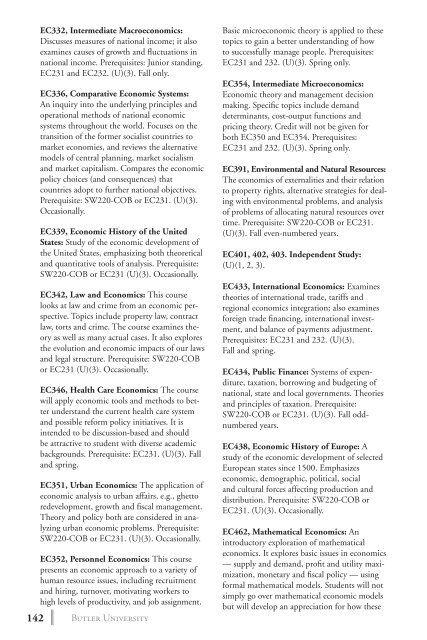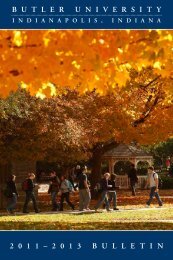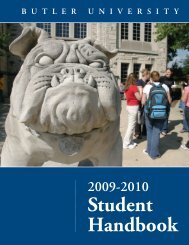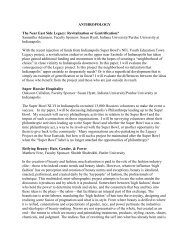The College of Liberal Arts and Sciences - Butler University
The College of Liberal Arts and Sciences - Butler University
The College of Liberal Arts and Sciences - Butler University
Create successful ePaper yourself
Turn your PDF publications into a flip-book with our unique Google optimized e-Paper software.
142<br />
EC332, Intermediate Macroeconomics:<br />
Discusses measures <strong>of</strong> national income; it also<br />
examines causes <strong>of</strong> growth <strong>and</strong> fluctuations in<br />
national income. Prerequisites: Junior st<strong>and</strong>ing,<br />
EC231 <strong>and</strong> EC232. (U)(3). Fall only.<br />
EC336, Comparative Economic Systems:<br />
An inquiry into the underlying principles <strong>and</strong><br />
operational methods <strong>of</strong> national economic<br />
systems throughout the world. Focuses on the<br />
transition <strong>of</strong> the former socialist countries to<br />
market economies, <strong>and</strong> reviews the alternative<br />
models <strong>of</strong> central planning, market socialism<br />
<strong>and</strong> market capitalism. Compares the economic<br />
policy choices (<strong>and</strong> consequences) that<br />
countries adopt to further national objectives.<br />
Prerequisite: SW220-COB or EC231. (U)(3).<br />
Occasionally.<br />
EC339, Economic History <strong>of</strong> the United<br />
States: Study <strong>of</strong> the economic development <strong>of</strong><br />
the United States, emphasizing both theoretical<br />
<strong>and</strong> quantitative tools <strong>of</strong> analysis. Prerequisite:<br />
SW220-COB or EC231 (U)(3). Occasionally.<br />
EC342, Law <strong>and</strong> Economics: This course<br />
looks at law <strong>and</strong> crime from an economic perspective.<br />
Topics include property law, contract<br />
law, torts <strong>and</strong> crime. <strong>The</strong> course examines theory<br />
as well as many actual cases. It also explores<br />
the evolution <strong>and</strong> economic impacts <strong>of</strong> our laws<br />
<strong>and</strong> legal structure. Prerequisite: SW220-COB<br />
or EC231 (U)(3). Occasionally.<br />
EC346, Health Care Economics: <strong>The</strong> course<br />
will apply economic tools <strong>and</strong> methods to better<br />
underst<strong>and</strong> the current health care system<br />
<strong>and</strong> possible reform policy initiatives. It is<br />
intended to be discussion-based <strong>and</strong> should<br />
be attractive to student with diverse academic<br />
backgrounds. Prerequisite: EC231. (U)(3). Fall<br />
<strong>and</strong> spring.<br />
EC351, Urban Economics: <strong>The</strong> application <strong>of</strong><br />
economic analysis to urban affairs, e.g., ghetto<br />
redevelopment, growth <strong>and</strong> fiscal management.<br />
<strong>The</strong>ory <strong>and</strong> policy both are considered in analyzing<br />
urban economic problems. Prerequisite:<br />
SW220-COB or EC231. (U)(3). Occasionally.<br />
EC352, Personnel Economics: This course<br />
presents an economic approach to a variety <strong>of</strong><br />
human resource issues, including recruitment<br />
<strong>and</strong> hiring, turnover, motivating workers to<br />
high levels <strong>of</strong> productivity, <strong>and</strong> job assignment.<br />
<strong>Butler</strong> <strong>University</strong><br />
Basic microeconomic theory is applied to these<br />
topics to gain a better underst<strong>and</strong>ing <strong>of</strong> how<br />
to successfully manage people. Prerequisites:<br />
EC231 <strong>and</strong> 232. (U)(3). Spring only.<br />
EC354, Intermediate Microeconomics:<br />
Economic theory <strong>and</strong> management decision<br />
making. Specific topics include dem<strong>and</strong><br />
determinants, cost-output functions <strong>and</strong><br />
pricing theory. Credit will not be given for<br />
both EC350 <strong>and</strong> EC354. Prerequisites:<br />
EC231 <strong>and</strong> 232. (U)(3). Spring only.<br />
EC391, Environmental <strong>and</strong> Natural Resources:<br />
<strong>The</strong> economics <strong>of</strong> externalities <strong>and</strong> their relation<br />
to property rights, alternative strategies for dealing<br />
with environmental problems, <strong>and</strong> analysis<br />
<strong>of</strong> problems <strong>of</strong> allocating natural resources over<br />
time. Prerequisite: SW220-COB or EC231.<br />
(U)(3). Fall even-numbered years.<br />
EC401, 402, 403. Independent Study:<br />
(U)(1, 2, 3).<br />
EC433, International Economics: Examines<br />
theories <strong>of</strong> international trade, tariffs <strong>and</strong><br />
regional economics integration; also examines<br />
foreign trade financing, international investment,<br />
<strong>and</strong> balance <strong>of</strong> payments adjustment.<br />
Prerequisites: EC231 <strong>and</strong> 232. (U)(3).<br />
Fall <strong>and</strong> spring.<br />
EC434, Public Finance: Systems <strong>of</strong> expenditure,<br />
taxation, borrowing <strong>and</strong> budgeting <strong>of</strong><br />
national, state <strong>and</strong> local governments. <strong>The</strong>ories<br />
<strong>and</strong> principles <strong>of</strong> taxation. Prerequisite:<br />
SW220-COB or EC231. (U)(3). Fall oddnumbered<br />
years.<br />
EC438, Economic History <strong>of</strong> Europe: A<br />
study <strong>of</strong> the economic development <strong>of</strong> selected<br />
European states since 1500. Emphasizes<br />
economic, demographic, political, social<br />
<strong>and</strong> cultural forces affecting production <strong>and</strong><br />
distribution. Prerequisite: SW220-COB or<br />
EC231. (U)(3). Occasionally.<br />
EC462, Mathematical Economics: An<br />
introductory exploration <strong>of</strong> mathematical<br />
economics. It explores basic issues in economics<br />
— supply <strong>and</strong> dem<strong>and</strong>, pr<strong>of</strong>it <strong>and</strong> utility maximization,<br />
monetary <strong>and</strong> fiscal policy — using<br />
formal mathematical models. Students will not<br />
simply go over mathematical economic models<br />
but will develop an appreciation for how these
















